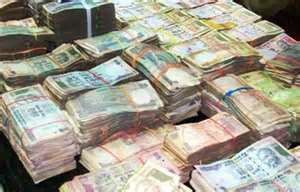 Hyderabad, May 4: The Election Commission (EC) has asked Andhra Pradesh authorities to step up vigil to check the use of cash in the elections during the next phase of polls on Wednesday in 13 districts of Seemandhra.
Hyderabad, May 4: The Election Commission (EC) has asked Andhra Pradesh authorities to step up vigil to check the use of cash in the elections during the next phase of polls on Wednesday in 13 districts of Seemandhra.
The EC was worried over the use of money power in Andhra Pradesh, state Chief Electoral Officer Bhanwar Lal said on Saturday. The police had seized Rs 140 crore so far. The EC was baffled by the fact that the volume of cash seized in Andhra Pradesh accounts for over 50 per cent of the total cash seized in the entire country. "CEC is worried. On Friday, they have asked us to double the number of flying squads," Lal told the reporters. The total cash seized in the ongoing elections in India was Rs 270 crore.
Apart from cash, 74 kg of gold, close to one tonne silver and around five lakh litres of liquor were also seized by the police so far, according to the CEO.
There are about 36.8 million voters in Seemandhra, which has 25 Lok Sabha and 175 Assembly constituencies. Authorities have set up over 40,000 polling stations. There are 333 candidates for the Lok Sabha and 2,243 candidates for the Assembly.
Election Commission officials on Saturday released the final polling percentages in all 10 districts of Telangana, according to which the polling was up by just two per cent this time around compared to the voting recorded in the 2009 elections.
According to data, the total percentage of voting in the Telangana districts on the April 30 polling was 70.85 per cent compared to 68.71 per cent in the 2009 elections.
The three parliamentary constituencies located in the Greater Hyderabad Municipal Corporation (GHMC) limits -- Hyderabad, Secunderabad and Malkajgiri -- proved a drag on overall poll percentage as these three recorded 52.52 per cent, 53.28 per cent and 51.19 per cent polling, respectively.
Chevella with just over 60 per cent is another constituency with low turnout.






Comments
Add new comment